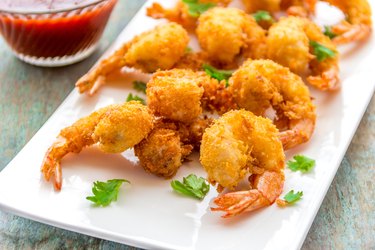
Peanut oil is a healthy plant-based fat. Also called groundnut oil, peanut oil is unique — it has a high smoke point, making it ideal for deep frying. Deep frying food in peanut oil and other vegetable oils can be healthy in moderation, as long as your chosen oil is low in saturated fat.
Read more: 18 Fat-Rich Foods That Are Good for You
Video of the Day
Video of the Day
Peanut Oil vs. Other Oils
According to the American Heart Association, peanut oil is a healthy fat. Oils that are considered healthy typically have less than 4 grams of saturated fat per tablespoon. The majority of their fat content comes from healthy monounsaturated and polyunsaturated fatty acids.
According to Harvard Health Publishing, other examples of healthy fats include:
- Avocado oil
- Canola oil
- Corn oil
- Flaxseed oil
- Olive oil
- Safflower oil
- Sesame oil
- Soybean oil
- Sunflower oil
- Walnut oil
Harvard Health Publishing's healthy cooking oil chart shows that these fats have around 15 percent saturated fat content or less. Out of these healthy fats, canola, safflower and sunflower oil have the lowest amounts of saturated fat.
Comparatively, fats like butter, lard, shortening, margarine, coconut oil and palm oil have much higher saturated fat contents. For example, a tablespoon of coconut oil can have more than 11 grams of saturated fat in each tablespoon. This means it has around three times, or more, saturated fat compared to healthy oils.
Saturated vs. Unsaturated Fat Consumption
The American Heart Association recommends consuming saturated fats in limited amounts (13 grams per day). Too much saturated fat consumption is bad for your health — saturated fat consumption has been associated with elevated cholesterol and triglyceride levels.
Excessive saturated fat consumption may consequently increase your risk for cardiovascular disease. In contrast, consumption of healthy monounsaturated and polyunsaturated fatty acids is thought to decrease your risk of heart disease and other health issues. Regardless of whether you're deep frying, pan frying or sautéing, you should try to use healthy fats whenever possible.
However, you should be aware that you can't deep fry with every healthy fat. Certain healthy fats, like flaxseed and walnut oils, have low smoke points, which means that they shouldn't be used for cooking and especially not deep frying.
Read more: 9 Delicious Recipes Made With Healthy Fats
Deep Frying with Healthy Oils
According to the Mayo Clinic, an oil's smoke point is the temperature at which it begins to smoke when heated. This smoke is a sign that your oil is breaking down. Once oil begins to smoke, it starts to lose some of its nutritional value. It may also cause your food to take on a burnt or bitter, unpleasant flavor.
Fats have different smoke points. For instance, many healthy nut and seed oils — like walnut, flaxseed and pumpkin seed oils — have low smoke points. They're likely to smoke when even low heat is applied. They should consequently be reserved for making salad dressings or dips, like hummus.
Most healthy oils are best used when you're cooking at medium heat. These include oils like avocado oil, olive oil, corn oil and canola oil.
However, a few healthy oils, like peanut oil, sesame oil and soybean oil have high smoke points. According to a May 2016 study in the [International Journal of Engineering Technology Science and Research](http://www.ijetsr.com/images/short_pdf/1464086185_icitesm412_ijetsr(1).pdf)_, coconut oil, sunflower oil and rice bran oil also have high smoke points, making them suitable for deep frying.
Although you might be tempted to use coconut oil for deep frying, remember that the smoke point isn't the only important aspect. The oil you choose to fry your food in can affect the nutrition of your food. Ultimately, peanut oil is a much healthier choice for frying than coconut oil thanks to its low saturated fat content.
- Mayo Clinic: "Which Type of Oil Should I Use for Cooking with High Heat?"
- American Heart Association: "Triglycerides: Frequently Asked Questions"
- American Heart Association: "Saturated Fats: Why All the Hubbub over Coconuts?"
- Harvard Health Publishing: "Choosing Oils for Cooking: A Host of Heart-Healthy Options"
- American Heart Association: "Healthy Cooking Oils"
- Harvard Health Publishing: "Healthier Oils Make Fried Food Safer"
- International Journal of Engineering Technology Science and Research: "A Study on Smoke Point and Peroxide Values of Different Widely Used Edible Oils"